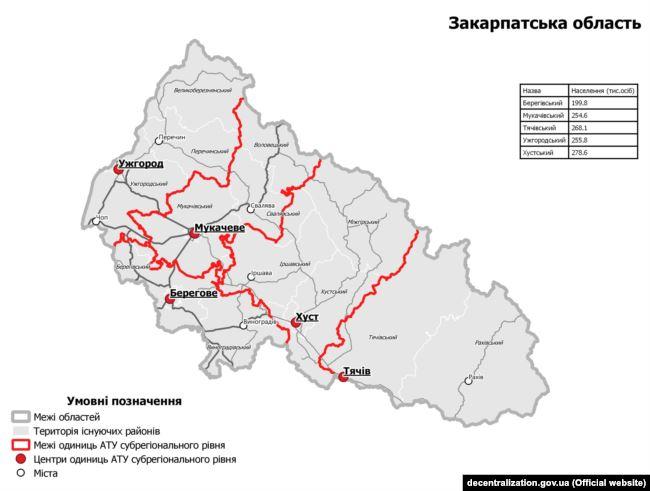
The Cabinet of Ministers of Ukraine on June 1 published a draft resolution laying down the newly formed districts across the country's regions. Five districts will be formed in the far-western Zakarpattia region (with the centers in Berehove, Mukachevo, Tyachiv, Uzhgorod, and Khusts), instead of four, as was provided for by decisions that had been preliminary agreed, being a historically motivated compromise option.
That's according to the Zakarpattia Online outlet.
In response to Cabinet's intention, signatures are being gathered for the appeal against the creation of a "Hungarian" district with a center in Berehove.
"This could lead to a phased escalation of anti-Ukrainian policies to split and divide the Ukrainian state in the future," the appeal says.
Writer Andriy Liubka in an op-ed published by RFE/RL's Ukrainian service says Ukrainian authorities made their first concessions to Budapest.
Read alsoUkraine, Hungary move to settle differences over minority legislation
According to him, now the majority of the population in the new district will be Hungarian speakers, since the district is actually located at the border with Hungary. At the same time, it is known that the Hungarians have been asking Ukraine for decades to create a separate administrative unit in Zakarpattia. Also, they have been promoting recognition of cultural autonomy for the minority and advocated the creation of a special "Hungarian constituency" in the elections to the Verkhovna Rada, Ukraine's parliament.
"Not a single Ukrainian government (even that of [Viktor] Yanukovych!) ever made such concessions, realizing all the potential threats it bears to the stability of the region and national security. In their decentralization projects, experts noted that it would a big mistake to enlarge the existing districts along ethnic lines. And, for example, they suggested that the Berehove district be combined with Irshava or Mukachevo districts, that is, to engage settlements with the Ukrainian population. The position of experts was not taken into account," writes Liubka.

As UNIAN reported earlier, relations between the two countries slid to a chill after the Ukrainian parliament in 2017 passed a new education law.
Hungary has since been blocking the meetings of Ukraine-NATO Commission, claiming alleged violation of rights of Hungarians living in Ukraine due to the provision of the law that determines that the language of command in educational facilities shall be the state language, which is Ukrainian.
According to the conclusion of the Venice Commission of Dec 8, 2017, Ukrainian authorities were recommended to balance the provision of the language article of Law "On Education".
On January 16, 2020, the Verkhovna Rada, Ukraine's parliament, passed bill No. 0901 on secondary education. Three models of learning the Ukrainian language in schools have been laid down.
The first model is provided for the indigenous peoples of Ukraine who do not live in the linguistic environment of their language and who do not have a state that would protect and develop this language. First of all, these are the Crimean Tatars. For them, the first model includes teaching in the language of the indigenous people from 1 to 11 (12) classes along with a thorough study of the Ukrainian language.
The second model is for schools with instruction in the language of national minorities whose languages belong to the EU languages. Depending on the language group and language environment, the use of this model may be different, but the basics are: - Elementary school: the use of the mother tongue along with the study of the official language; - Grade 5: at least 20% of the annual volume of study time should be taught in Ukrainian with a gradual increase in volume so that in grade 9 to reach at least 40% of subjects that are studied in the official language; and - High school: at least 60% of the annual amount of study time in these institutions should be instructed in the official language.
The third model will work for the rest of the national communities of Ukraine. It concerns national minorities whose language belongs to one of the Ukrainian language families, as well as those who live mainly in the environment of their own speech (Russian language). Primary schools there will also have a minority language along with the study of Ukrainian, and from grade 5 at least 80% of school hours will be instructed in the official language.
At the same time, Hungarian Foreign Minister Peter Szijjarto says Hungary proposes not to increase the number of subjects taught in Ukrainian for the national minorities, which is provided for by the new law on secondary education.

